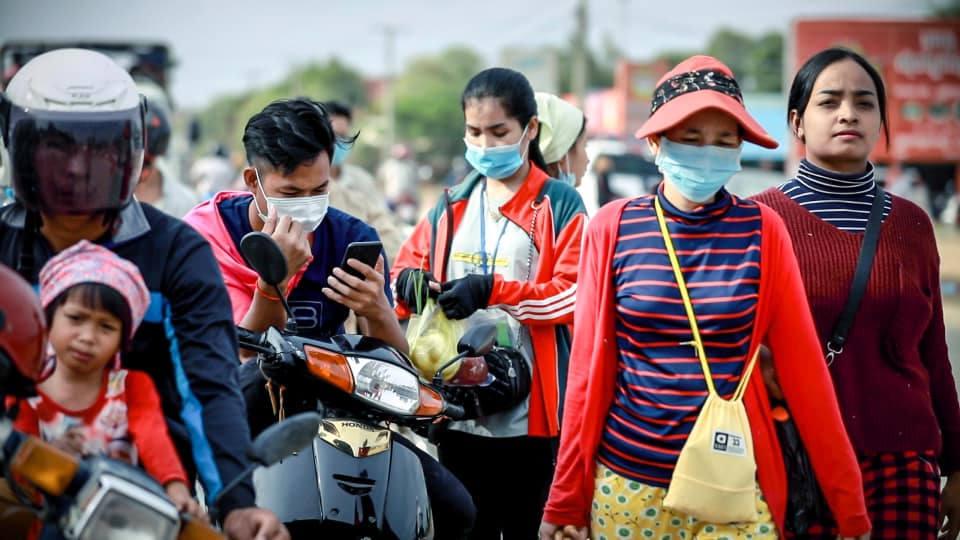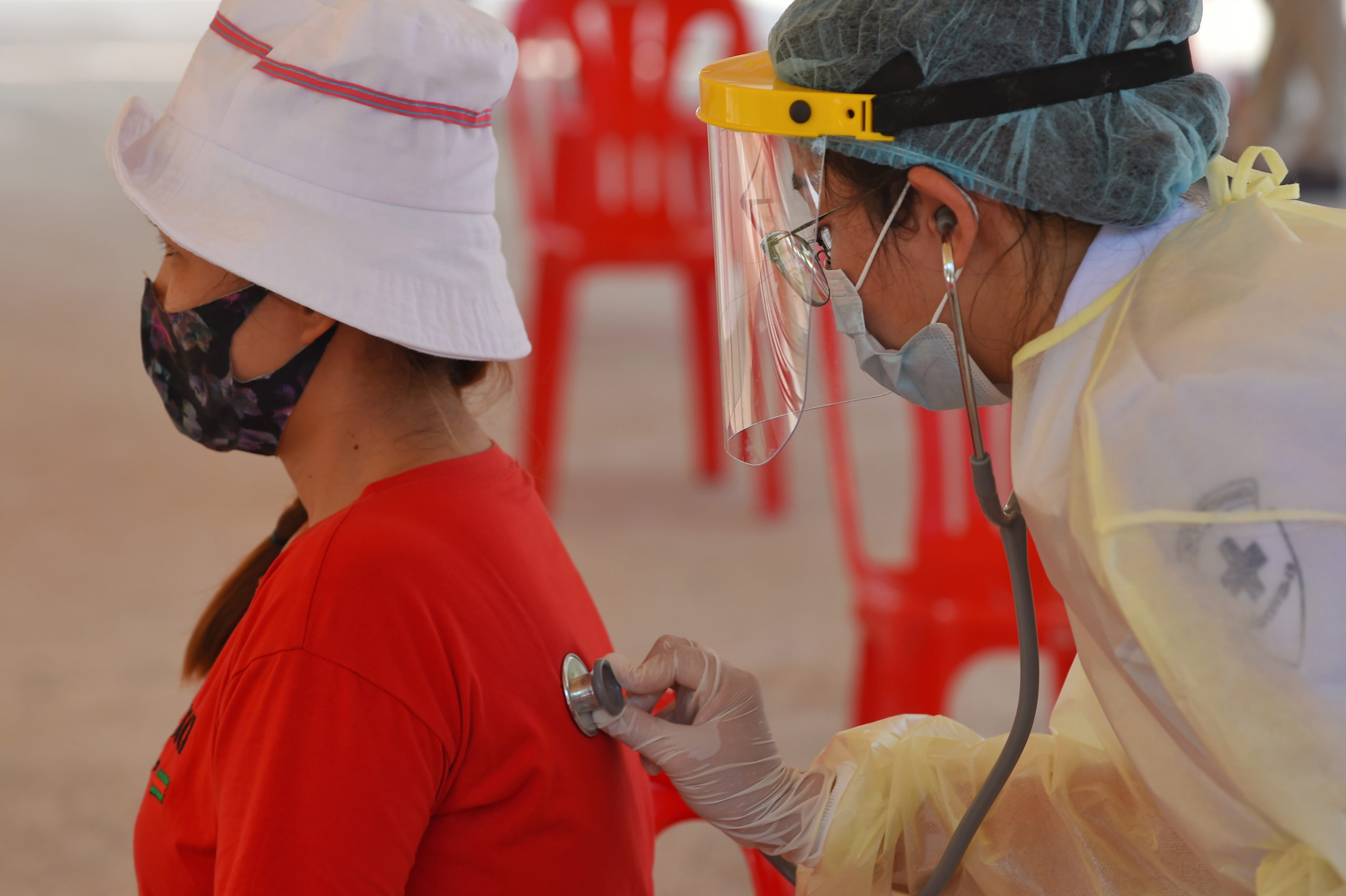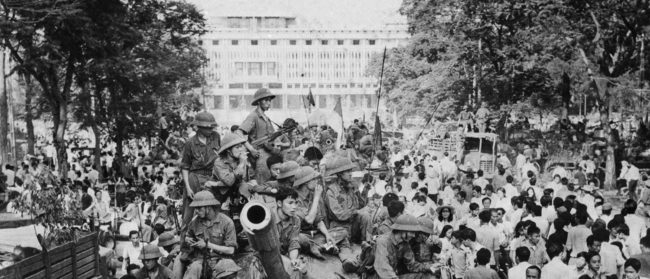Patrick Lee is a Legal Advisor at CENTRAL. CENTRAL is a local Cambodian labour rights organisation working to empower Cambodian working people to demand transparent and accountable governance for labour and human rights.
The Cambodian Government, like many, was slow to react to the COVID-19 spread, though their initial response was more dismissive than most.
In late January, with the virus still largely confined to China, Prime Minister Hun Sen threatened to eject journalists from a press conference for wearing face masks, stating that fear caused by disinformation was the real illness.
It was surprising then, when not two weeks later, Ministry of Labour and Vocational Training spokesman Heng Sour apparently gave credence to the virus’ severity, warning of garment factory suspensions or closures in March due to insufficient raw material imports following factory closures in China. Some saw the statement as little more than another attempt to deflect attention from the potential impacts of the European Commission’s decision to suspend 20% of Cambodia’s tariff-free access to the European market from August 2020.
By early March, more than 30 factories had suspended operations, affecting approximately 20,000 workers. Simultaneously, with significant declines in primarily Chinese tourists, eight hotels in Siem Reap closed, with another 20 not paying salaries. On 9 March, Chinese imports resumed. By then, 50 factories had suspended employment, affecting 20,940 workers. The Government, though, trumpeted the resumption of imports as a resounding success, pointing to the re-opening of seven factories following the resumption as evidence.
By the end of March, confirmed Covid-19 cases globally exceeded 750,000, with more than 420,000 in Europe and over 140,000 cases in the United States. Governments across the globe announced increasingly strict restrictions on travel and movement. In Cambodia, the Government closed all schools, karaoke, cinemas, beer gardens, gyms, massages and spas, leaving hundreds of thousands without work and without social protection.
Concurrent declines in tourism also forced the closure of a number of restaurants and other businesses. At the same time, the Law on Governing the Nation in a State of Emergency was introduced. The Law, heavily criticised by human rights groups, grants the Government extraordinary powers in prohibiting or restricting freedom of expression both online and offline in terms of travel, meetings, work and publishing of information which could cause panic or chaos, damage national security, or cause confusion about the state of emergency.
Travel restrictions were implemented over the Khmer New Year holiday (despite the King not having approved the emergency law) to prevent possible infection by the hundreds of thousands of garment workers travelling home. The Ministry ordered workers to continue working over New Year, with public holidays to be repaid later, and threatened those who took leave with termination for serious misconduct. However, some had already left prior to regulations being issued. In at least one case, these workers were terminated upon their return, although all but one has since been reinstated.
The economic impacts of lockdowns have left more than ten million people jobless in the United States as well as more than a million in Europe. The physical effects of the lockdowns, coupled with record declines in consumer spending, caused mass cancellations by brands of orders placed with supplier factories in countries like Cambodia.
Companies such as H&M and VF Corporation guaranteed payment for orders completed and in production, helping workers quickly receive wages. Some brands, such as PVH, requested extended payment terms, whilst others, like C&A cancelled all orders up until June without payment (but has since claimed to have reinstated 93% of these orders). It is imperative that brands follow through on payment for already-completed and already-placed orders to ensure workers can receive wages owed.
Existing protection mechanisms are inadequate
On April 28, the Ministry announced that more than 130 garment factories had suspended operations, affecting nearly 100,000 workers, whilst claiming only six factories had closed because of the virus, with more than 6000 workers affected. However, the long-term financial sustainability of some of these factories remains questionable considering many factories preferred closure before being encouraged by Ministry officials to suspend instead.
In February, the Prime Minister announced that suspended garment workers would receive 40% ($76) of their $190 monthly minimum wage from their employers, whilst the Government would provide an additional 20% ($38). Employers very quickly claimed they could not afford to continue paying 40% as ordered and demanded changes. In April, the Prime Minister did just that.
Payments were extended to affected tourism sector workers in several provinces, but were reduced to a total of $70 month, with $30 from employers and $40 from the Government.
Providing workers with allowances less than the poverty line, whilst simultaneously denying them to hundreds of thousands of people also out of work, will serve only to heighten workers’ vulnerabilities
The policy change came just before Khmer New Year, as the number of suspended factories shot up to over 100 with rumours swirling of more to come after the holiday. It had all the hallmarks of a Government flustered and under pressure, forced into making policy on the fly because they had reacted to the virus too late.
Even now, the Government will be nervously observing the situation in its two biggest export markets, Europe and the United States. Whilst some European nations are cautiously suggesting that, for them, the worst may have passed, the United States, with over one million confirmed cases, is still some way off.
With no end to the pandemic in sight, the longevity of the Government’s otherwise short-term solutions will certainly come into focus.
In 2013, a Cambodian inter-ministerial working group calculated the poverty line for those living in Phnom Penh and other urban areas as being 193,052 riel ($47.45) and 132,386 riel ($32.54) per month respectively. Based on July 2019 consumer price index data and the 2019 General Population Census released by the National Institute of Statistics, this poverty line increases to $128.61 and $88.19, respectively. Yet, in 2020, suspended workers will receive a mere $70 per month as support.
The situation is even more dire for those workers who have lost their employment because of the virus and who aren’t covered by Government allowances.
For example, cleaning workers employed at subcontractors at Siem Reap International Airport have all been suspended because of reductions in tourist numbers during the virus. Although these workers have lost their employment as a result of Covid-19, none of them are receiving these monthly allowances ordered by the Government. Similarly, none of the workers in the cinemas, clubs, karaoke, gyms, beer gardens, massages and spas closed by the Government, nor in the businesses also forced to close due to declining tourism, are receiving monthly allowances.
For the predominantly young, indebted female workforce in the entertainment sector, this lack of social protection and support leaves them particularly vulnerable.

Even without calculated figures, it is clear that these allowances simply aren’t enough for workers to live on. Landlords have exhibited no leniency regarding rental payments during the pandemic.
Workers’ monthly rent in Phnom Penh can range from anywhere from $30 to $70, with prices in urban areas outside the city hovering around $30. Along with utilities (exacerbated by Cambodia’s exorbitant electricity prices), accommodation costs alone may use up most, if not all, of the Government allowance, without even considering food. This has severe effects not for only workers, but also young children and elderly relatives dependent on their income.
Significantly high levels of worker indebtedness add another layer of stress. Whilst banks and microfinance institutions have indicated willingness to suspend loan repayments and not seize property from suspended garment workers, many suspended workers outside the sector claim they are still required to make monthly repayments despite employment suspension.
It is alarmingly clear that the current Government provisions are insufficient for dealing with the economic fallout of the Covid-19 pandemic. Providing workers with allowances less than the poverty line, whilst simultaneously denying them to hundreds of thousands of people also out of work, will serve only to heighten workers’ vulnerabilities and plunge already indebted families further into debt.
With the prospective loss of $1.1 billion worth of exports to the EU through loss of 20% of preferential rights under the Everything But Arms scheme, COVID-19 could not have come at a worse time for Cambodia.
The Cambodian Government urgently needs to adopt a proper long-term strategy that first and foremostly serves working people’s interests. Government allowances must be increased so as to allow suspended and terminated workers and their families to live with dignity during the crisis. The Government needs to realistically evaluate the number of companies it expects to remain financially viable and ensure there are sufficient support and protection mechanisms in place for workers whose workplaces do close until they can transition into new employment.
In crafting an economic recovery, the Government should not, as some other nations have, look at increased ‘flexibility’ in the industrial relations scheme (such as its proposal to drop night shift workers’ wages). Rather, it should pursue changes which ensure well-paid and secure employment for workers to lift them out of indebtedness and poverty.
Cambodia’s best pathway through the COVID-19 crisis is to invest and place its faith in the Cambodian people through a long-term economic recovery strategy that ensures well-paid and secure employment that can lift families out of debt and which is respective of the fundamental rights and freedoms of Cambodian workers.


